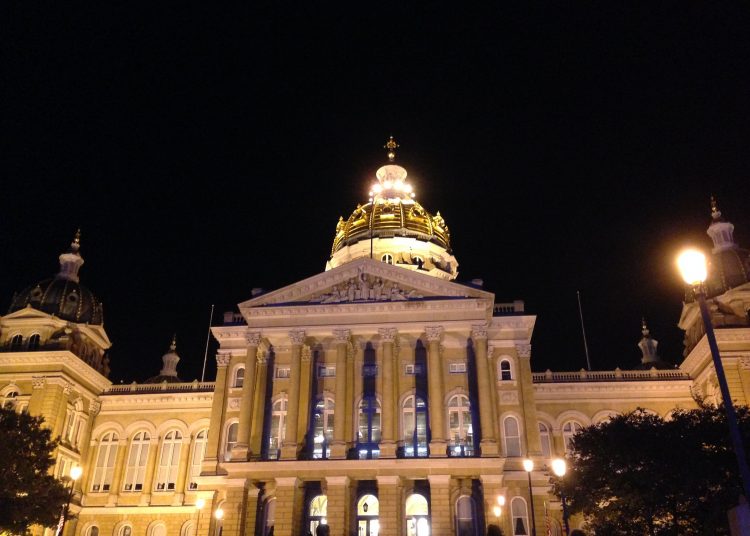DES MOINES, Iowa – After a three-hour-long debate on Thursday, the Iowa House of Representatives passed HF 868, the education appropriations bill for fiscal year 2022, by a 51 to 38 vote.
The bill’s total appropriation is $970.35 million for the Iowa Department of Education, College Student Aid Commission, Iowa Department of the Blind, and Iowa Board of Regents. Funding for Iowa’s K-12 public schools passed in a separate bill in February.
Iowa House Republicans added accountability measures for public and accredited non-public K-12 schools in an amendment.
State Rep. Holly Brink, R-Oskaloosa, introduced the amendment.
“While COVID-19 definitely brought heartaches, hardships, and challenges, one positive thing that came from it was parents got involved in education. The oversight committee, as well as many of you in this chamber, received hundreds of emails from parents asking for directions and asking for help,” she said.
Brink said the amendment was a response to those emails from parents who had concerns about their public schools and what, she said, the Iowa Department of Education said they needed to address the situation.
The amendment requires the Iowa Department of Education to maintain a parental concern section on their website, something that now exists.
Brink said that disciplinary actions are either a “slap on the wrist” or a school losing its accreditation or an educator losing his or her license. She said the amendment would provide additional steps.
“Many parents have gone to teachers, administration, school boards, and they feel they’re not being heard,” she said.
The amendment allows community members to force school boards to have a public hearing by petition if at least five percent of the number of people who voted in the previous school board election support it. Community members can also trigger an accreditation committee site visit to the school district by petition if the number of signatures equals 20 percent of the school district’s electorate.
Also, if passed, there would be steps that include audits, on-site visits, and monitoring if a school demonstrates that it is non-compliant with federal education laws or state accreditation standards. It gives the state the ability to withhold funding for non-compliance until the school is back in compliance. If non-compliance continues, the state would temporarily take over oversight of the school district. If the defined deficiencies continue, the state would deaccredit the public school and merge the school district with one or more neighboring school districts.
The amendment also requires any equity coordinator hired by school districts to undergo training over the freedom of speech under the First Amendment.
State Rep. Monica Kurth, D-Davenport, a retired teacher, opposed the amendment.
“It seems to me that this opens up the possibility of attacking a lot of pieces of curriculum,” she said. “Perhaps this is a directed punishment that will be used to halt I don’t know, think of all the possible controversial subjects that could be taught in a school, maybe history, maybe literature, maybe black history, or sex education. If we allow five percent of the population to attack the curriculum, we are saying that we do not trust our professional educators.”
“The state is basically declaring war on its own school districts. There’s no move toward actually helping districts to focus that the focus is on constant monitoring, and punishment,” Kurth added.
State Rep. Cindy Winckler, D-Davenport, another retired educator, was concerned about parental and community “interference” into the “offer and teach requirements of our K-12 system.” She was also concerned about the potential disrupting of aligning assessments to a school’s curriculum.
She said giving five percent of residents of a school district the ability to place a hold on curriculum is “dangerous.”
“It’s dangerous because you have a very small minority that are calling the shots,” Winckler said.
State Rep. Mary Mascher, D-Iowa City, was concerned that the fiscal impact of the amendment was not known.
“I am appalled that this body would consider legislation of this monumental shift without having a fiscal impact. It is beyond belief,” she stated.
Mascher also pointed out that the state does not have the authority to withhold federal funding for local school districts.
“The money is passed through for the state of Iowa, and it goes directly to the districts. You are violating federal law. If you pass something this irresponsible. I am more than appalled. I am ashamed that this body would support an amendment of this magnitude without having vetted it well,” she said.
In her closing comments on the amendment, Brink said that the public hearing language is necessary because current law requires 20 percent of the electorate, and gathering that many signatures before a school board vote on curriculum is next to impossible.
“Sometimes they only have two days to get from the time of school puts out the curriculum until the vote is done by the school board. And that actually happened to state this year,” Brink said. “They had two days; they would have had to get 681 signatures in two days. I think that’s a lot of work. And it only puts the curriculum on hold. It just puts it (in a) public hearing to have discussion, to get parents involved. I’m pretty sure most of the teachers that I talked to say we need more parents involved. We need more parents involved. This can help get parents involved. So we’re giving them what they asked for.”
She claimed that federal funding to states is subject to the governor, so withholding funds would not violate federal law. Brink also said there was a lot of input into the amendment’s language from various organizations, parents, and teachers.
Brink reiterated that parents need to be involved and have a voice.
“We have amazing teachers. We have amazing students. We have amazing parents. This is a great state. But we have to ensure that we keep moving forward. We have to make sure that we keep helping our children. I’ve said it numerous times, and I will say it again. We have schools that are indoctrinating our children and not educating them. That is not okay,” she stated.
The amendment passed 53 to 36.
Listen to the entire Iowa House debate on HF 868 below:















